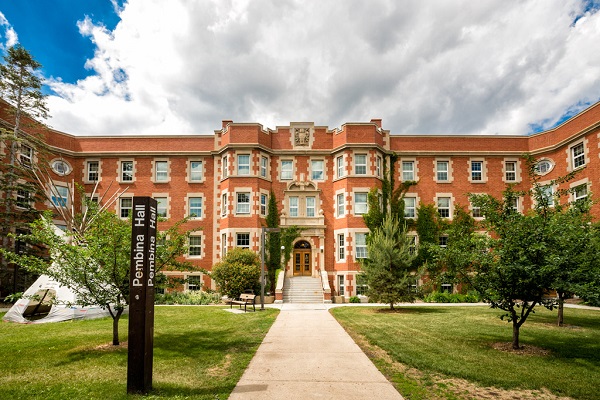Genetic testing could improve care for youth living with autism spectrum disorder
“Knowledge translation.” It’s a buzz phrase in the academic world these days, so to translate: It means taking new discoveries made through research and making them accessible in clinical settings for the benefit of patients as soon as possible.
Knowledge translation is a key goal of the new CASA Research Chair in Child and Adolescent Mental Health in the Department of Psychiatry at the University of Alberta, thanks to a donation of $4.5 million over 10 years.
“The priority will be to try to help families meet their needs in the way that best aligns with their values,” says Daniel Moreno De Luca, who was recently hired as an associate professor of psychiatry and was named the inaugural CASA Research Chair today.
“CASA is excited to add the experience and expertise of Dr. Moreno De Luca to the mental health community in our community,” says CASA Mental Health CEO Bonnie Blakley. “His research and his work alongside our staff and patients will help advance child and youth mental health care in Alberta, helping us to empower children, youth and families to thrive.”
CASA, a local non-profit that delivers mental health services to Alberta children aged three to 18 who are not in the hospital, has recently been tapped by the Government of Alberta to expand its services across the province to the tune of $92 million over the next three years.
“CASA’s mission of providing evidence-informed and compassionate care is closely aligned with my strong advocacy to ensure that precision medicine and translational genomic interventions are broadly and equitably available for children with mental health needs, and these synergistic efforts are an important win for the families of Alberta and beyond,” Moreno De Luca says.
As chair, Moreno De Luca will spend 20 per cent of his time seeing patients and will also help train new psychiatrists working with children and adolescents. He is an expert on the link between genetic changes and mental health conditions such as autism spectrum disorder (ASD) and schizophrenia, and will continue to lead his Precision Medicine in Autism (PRISMA) research program at the U of A.
Psychiatric genetics a new and growing field
In 2019, Health Canada reported about one in 50 Canadian children and youth had been diagnosed with autism spectrum disorder. People with ASD may experience communication problems, have difficulty with social interactions and tend to repeat specific behaviours, according to Autism Canada. ASD can be difficult to diagnose and usually involves an observation of behaviour, a physical examination and extensive consultation with the family, according to the Autism Spectrum Disorder Guidelines Task Force of the Canadian Pediatric Society.
Genetic testing has become increasingly available in recent years to help confirm various medical diagnoses or even predict outcomes in healthy children from families with genetic conditions, but an understanding of the connection between genetic differences and neurodevelopmental conditions such as ASD and schizophrenia is more recent.
“All of our efforts are aligned between the clinic, research, education and community engagement, and we hope to move all of them forward simultaneously,” Moreno De Luca says. “We want to identify and address barriers for care — specifically for access to genetic testing for people on the autism spectrum and with developmental conditions.”
One-third of cases of autism spectrum disorder are caused by rare genetic differences that have a large effect, says Moreno De Luca, so offering genetic testing is now the recommended standard of care for children after a diagnosis is made. Direct gene therapy is still on the horizon, but knowing the genetic origins of ASD can help clinicians tailor treatment for those who need it, proactively screen for other medical conditions for which people may be at higher genetic risk, such as heart trouble or diabetes, and predict potential negative reactions to certain drugs based on underlying susceptibilities. It also means patients with similar conditions can connect for social support.
The tests offered may include chromosomal microarray, to look for any missing or extra pieces of DNA within the genome, collectively known as “copy number variants”; Fragile X testing, to identify changes to the Fragile X messenger ribonucleoprotein 1 gene, which produces a protein essential for brain development; and exome and genome sequencing, to look for single nucleotide variants, a small type of change in the entire genome.
Much to learn
Moreno De Luca’s research has shown that only three per cent of eligible patients receive the recommended testing, likely because it is not always offered. He believes physician education will help because he has also found that the vast majority of families who are offered the tests agree to have them done.
“We have a very large gap to fill between those professional recommendations and the current clinical practice,” he says.
Moreno De Luca is an expert in two of the rare genetic changes that are linked to an increased risk of ASD, 17q12 deletion syndrome and 15q13.3 deletion syndrome. He intends to continue working to understand how and why these and other genetic changes affect some patients and not others.
“We’re hoping that the lessons that we learn when studying these conditions along with the community can be applied broadly to other rare genetic causes of autism,” he says.
Moreno De Luca comes to Edmonton from Brown University and Bradley Hospital in Providence, Rhode Island, where he was also an attending psychiatrist at the Verrecchia Clinic for Children with Autism and Developmental Disabilities and clinical director of genomic psychiatry and genetic counselling services.
Moreno De Luca will work closely with the autism and rare disease communities to guide his research and plans to launch genomic psychiatry services in collaboration with the U of A’s medical genetics department to offer testing and followup services to families. He will also build research collaborations with members of the Women and Children’s Health Research Institute and the Neuroscience and Mental Health Institute.

